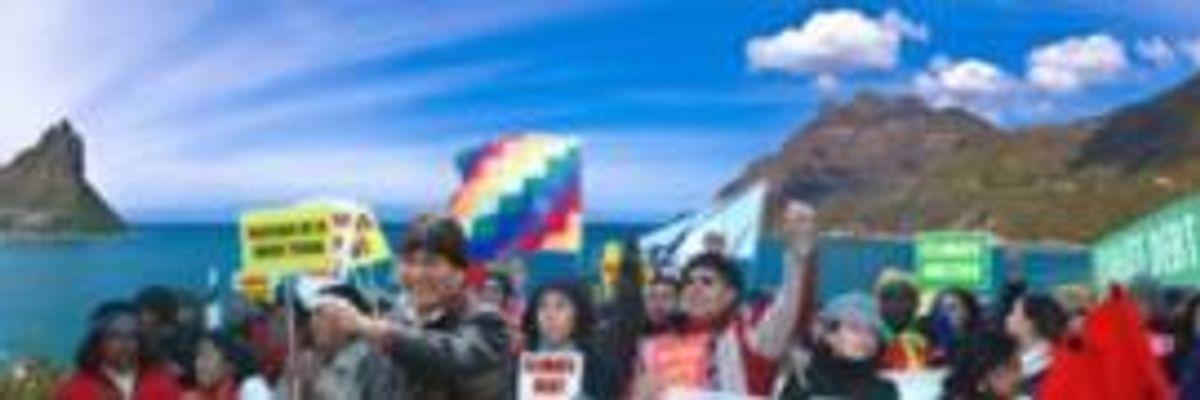LA PAZ - A different way of
fighting global warming will be tried out in the central Bolivian city
of Cochabamba when government representatives and thousands of
activists gather for the World People's Conference on Climate Change
and the Rights of Mother Earth.
The social organisations
sponsoring the Apr. 19-22 conference have announced an alternative
platform to the efforts of the 15th Conference of the Parties to the
United Nations Framework Convention on Climate Change (COP-15), which
ended in failure in icy Copenhagen in December 2009.
The defence of Mother Earth, championed by Bolivian President
Evo Morales, has the support of more than 240 grassroots and indigenous
movements, non-governmental organisations, activists and intellectuals
who are calling for a charter of rights for the planet.
The main aims of the conference are to organise a world
people's referendum on global warming, draw up an action plan to create
an international climate justice tribunal, and agree new commitments to
be negotiated within United Nations scenarios.
The agenda priorities are: climate debt, climate change
migrants and refugees, greenhouse gas emission cuts, adaptation,
technology transfer, financing, forests and climate change, shared
visions and indigenous peoples.
"We, as activists from different social movements, define the
present time by the arrogance of the United States, European Union and
transnational corporations, which was expressed at Copenhagen where a
very few countries attempted to impose an outcome - that was not agreed
at COP 15 - to do nothing to stop rising global temperatures and
climate damage," said the event announcement by leading social
organisations.
These organisations include the Hemispheric Social Alliance
(ASC-HSA), Friends of the Earth Latin America, the Trade Union
Confederation of the Americas (TUCA-CSA), the World March of Women,
Campaign 350.org and Via Campesina.
Morales will formally open the conference on Apr. 20.
The organisations identify a "crisis of civilisation" that they
attribute to capitalism and the "logic of exploitation, racism and
patriarchy," which they see in "increased military presence and
military bases in various parts of the world, and 'humanitarian'
invasions and occupations" which are actually war, they say.
War, the occupation of markets and territories, and
militarisation to control energy resources, water and biodiversity, are
pointed out as capitalism's methods for solving its own crisis.
The World People's Conference on Climate Change will advocate
the right to "live well," as opposed to the economic principle of
uninterrupted growth.
In contrast to Copenhagen, where industrialised countries
sought a formula for greenhouse gas emissions reductions that would not
imply binding commitments, at Cochabamba it will be the popular sectors
that take the lead.
"For a long time, the voices of indigenous peoples and social
organisations have not been heard. Their movement has been growing
underground, in rural areas and the outlying suburbs of cities,"
environmentalist Carmen Capriles, of the Bolivian chapter of Campaign
350.org, told IPS.
Their knowledge, as farmers or livestock raisers, means they
can promptly identify the climate phenomena that their way of life and
economic wellbeing depend on, she said.
Campaign 350.org is named for the 350 parts per million of
carbon dioxide in the atmosphere that scientists regard as the "maximum
safe limit" for the concentration of this gas, without triggering
climate catastrophe.
The conference is distinguished by being "for and with
indigenous peoples, unlike any other world conference held to date,"
Bolivian economist and environment expert Stanislaw Czaplicki told IPS.
Czaplicki was at Copenhagen as a civil society representative,
and coordinated networks of young Latin American environmental
activists.
"Indigenous peoples and social organisations have already
formed a worldwide movement in defence of the planet, and civil society
has a major role in the development of public policies," he said.
However, "women and young people are under-represented," he added.
In Capriles' view, new movements capable of generating
alternative proposals are needed, and she called for political will on
the part of developed countries to make structural changes in their
economies.
Czaplicki said there are political movements in Europe that
are against models of development that harm the environment, but they
do not express anti-capitalist thinking, and neither do they distance
themselves from the international financial institutions.
These movements arise in countries that achieved development
by environmentally harmful means, not in countries that can still
choose their model of economic growth, he said.
In the case of Bolivia, policies opposed to capitalism and
polluting industrialisation have not yet changed the model of
extracting commodities like minerals and gas, Czaplicki said. As a
result, 300,000 hectares are deforested every year, he said.
Theory and practice must come together, he said.
